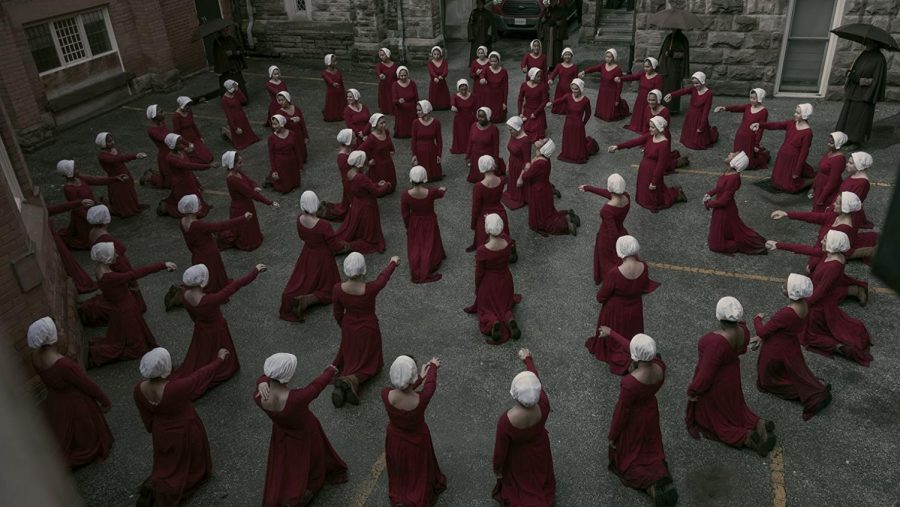Review: ‘The Handmaid’s Tale’ season two premiere
The second season of “The Handmaid’s Tale” premiered on Hulu on April 25. The critically acclaimed show is based on a famous dystopian novel by Margaret Atwood. (Image courtesy of IMBD)
Note: This article contains spoilers for seasons one and two of “The Handmaid’s Tale”.
After much anticipation, “The Handmaid’s Tale” returned to Hulu on April 25. The series, based on Margaret Atwood’s 1985 dystopian classic of the same name, first debuted in 2017 to critical acclaim, with both critics and fans alike praising the show’s timely political messages. The show later proved to be an awards juggernaut, sweeping the Emmys and consistently ranking on year-end best of TV lists. WIth the new season debuting, the question remains, as with many new iterations of beloved stories: will the new season live up to the glory of its predecessor?
For those in need of a refresher of season one, here’s a quick recap: “The Handmaid’s Tale” follows Offred, a handmaid in the Republic of Gilead. Prior to the events of the series, the United States was gradually taken over by the Sons of Jacob, a fundamentalist Christian group who gradually subjugated the rights of women.
Sensing the danger to come with the new regime, Offred attempted to escape to Canada with her husband and young daughter, but was instead thwarted, with her husband being presumed dead and her daughter being placed under the care of the government. Offred’s real name is later revealed to be June, with the name “Offred” denoting her ownership to Commander Fred Waterford, a high-ranking Gilead official. Throughout the season, Offred is given bits of information regarding a resistance against Gilead called Mayday. Season one ends with Offred pregnant, not with the Commander’s child, but his driver and government spy, Nick, as a scheme crafted by the Commander’s wife Serena Joy, who is desperate to be a mother. After Offred protests the stoning of fellow handmaid Janine, her peers follow suit. Season one ends with Offred being taken away in a van by government officials, towards an uncertain future.
Season two begins right where season one ended, with Offred sitting silently in the back of the van, headed towards the unknown. After minutes of silent contemplation, the door opens, and Offred is yanked out of the van, where she is then muzzled and restrained. She isn’t alone; all of the other Handmaids are with her, shoved into a massive cluster and forced to run to their unknown location. After much confusion, they are revealed to be at an abandoned Fenway Park, with the empty stadium filled with rows of gallows. The fear and desperation in Offred’s eyes conveys the entire mood of the scene, with actress Elisabeth Moss accomplishing wonders with no words. The camera pans over the seemingly doomed Handmaids, all weeping and shuddering in fear. After what feels like an agonizing amount of time viewing their desperation, the mass execution is revealed to be an elaborate ruse as punishment for their disobedience in the previous season. As Aunt Lydia, played with expert villany by Ann Dowd, emerges from the stands quoting scripture and reminding the Handmaids of their place in Gilead, one thing is clear: Rebellion is a death sentence.
Scenes of Offred’s life before Gilead are interwoven with the present-day terror. We’re shown a normal day in the life of June, as she was known then, and her family. June’s daughter Hannah is feeling poorly on account of a slight fever, which June attempts to heal by giving her some Tylenol. While preparing to head to work and take Hannah to school, June asks her husband Luke to sign off on the required waiver allowing her to remain on birth control. While Luke remarks at the ridiculous new law that requires a husband’s approval to have birth control, June coyly offers that he does not sign the form at all, implying that the couple wants a second child. The scene, while brief, accomplishes a great deal: It sheds a light on the slow progression of America’s descent into Gilead, with women needing spousal consent in order to use birth control.

(Image courtesy of IMBD)
Despite the oppressive nature of the law, June and Luke happily discuss the prospect of having another child; they are aware of the rigidity of the law, but their lives go on seemingly unaffected, with June carting Hannah off to school amidst a playful embrace from her husband, smiles and all.
Back in present day, the Handmaids are being punished once more for their act of rebellion by being forced to hold stones in the pouring rain. Aunt Lydia parades around them, kept dry by an umbrella, continuing with her warped scripture and punishing Handmaids buckling under the rain with a cattle prod. Offred’s suffering is not for long, though; her pregnancy is revealed to Aunt Lydia by a fellow Aunt, and the usually-terrifying villain rejoices, later weeping tears of joy. Offred is then taken out of the rain, and given a warm meal and dry clothes. Aunt Lydia joins her, still uncharacteristically chipper, and informs Offred that her pregnancy will result in special treatment for her. When Offred repeatedly refuses to eat the soup given to her, Aunt Lydia reverts back to her authoritarian demeanor and informs Offred that every Handmaid who followed her in defiance will suffer. She then leads Offred to a pregnant Handmaid, chained to a bed and left in darkness due to her disobedience during her pregnancy. It is a warning: obey or this will be your fate. Offred forces a smile and obeys Aunt Lydia, eating her soup while her fellow Handmaids are lined up inside. The women then have their hands chained to a stove, screaming in agony as they are burned. Offred sits in silence and eats her soup, remembering Aunt Lydia’s lesson.
After her first ultrasound appointment with the Waterfords, the ultrasound technician leaves Offred with the phrase: “Godspeed, June.” Offred is startled by the use of her real name, and finds a key with red tape on it. She exits the room, down a dark corridor, and into the back of a truck, where she escapes. She is eventually dropped off at an abandoned building, where Nick waits for her. Offred proceeds to burn her Gilead attire, cut her hair and gruesomely cut out the tracker in her ear that marks her as a Handmaid. As the blood gushes from her ear, Offred continues to hack away at the tracker, symbolically severing away the oppression she faced by Gilead’s hand. The episode closes with Offred declaring: “My name is June Osborne. I’m from Brookline, Massachusetts. I’m 34 years old. I stand five-foot-three in bare feet. I weigh 120 pounds. I have viable ovaries. I’m five weeks pregnant. I am free.”
Season two of “The Handmaid’s Tale” has a lofty legacy to uphold: Recapture the magic of season one while at the same time please fans of the book. It’s no small order, but the season two premiere proves that the series is more than capable of portraying both the dystopian hell of GIlead and the optimistic hope of a new future. If the rest of this season follows the example of “June,” it’s safe to say that season two will be even better than the first.






![DePaul sophomore Greta Atilano helps a young Pretty Cool Ice Cream customer pick out an ice cream flavor on Friday, April 19, 2024. Its the perfect job for a college student,” Atilano said. “I started working here my freshman year. I always try to work for small businesses [and] putting back into the community. Of course, interacting with kids is a lot of fun too.](https://depauliaonline.com/wp-content/uploads/2024/04/ONLINE_1-IceCream-600x400.jpg)







